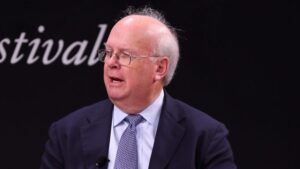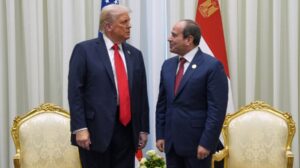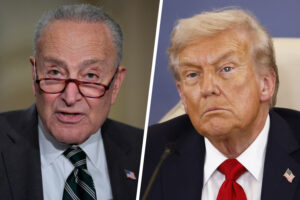The Dictatorship
Trump says inflation is ‘defeated’ and the Fed has cut rates, yet prices remain too high for many

WASHINGTON (AP) — Inflation has risen in three of the last four months and is slightly higher than it was a year ago, when it helped sink then-Vice President Kamala Harris’ presidential campaign. Yet you wouldn’t know it from listening to President Donald Trump or even some of the inflation fighters at the Federal Reserve.
Trump told the United Nations General Assembly late last month: “Grocery prices are down, mortgage rates are down, and inflation has been defeated.”
And at a high-profile speech in Augustjust before the Fed cut its key interest rate for the first time this yearFederal Reserve Chair Jerome Powell said: “Inflation, though still somewhat elevated, has come down a great deal from its post-pandemic highs. Upside risks to inflation have diminished.”
Yet dismissing or even downplaying inflation while it is still above the Fed’s target of 2% poses big risks for the White House and the Federal Reserve. For the Trump administration, it could find itself on the wrong side of a potent issue: Surveys show that many Americans still see high prices as a major burden on their finances.
The Fed may be taking an even bigger gamble: It has cut its key interest rate on the assumption that the Trump administration’s tariffs will only cause a temporary bump up in inflation. If that turns out to be wrong — if inflation gets worse or remains elevated for longer than expected — the Fed’s inflation-fighting credibility could take a hit.
That credibility plays a crucial role in the Fed’s ability to keep prices stable. If Americans are confident that the central bank can keep inflation in check, they won’t take steps — such as demanding sharply higher pay when prices rise — that can launch an inflationary spiral. Companies often increase prices further to offset higher labor costs.
But Karen Dynan, a senior fellow at the Peterson Institute for International Economics, said this week that with memories of pandemic-era inflation still fresh and tariffs pushing up the cost of imported goods, consumers and businesses could start to lose confidence that inflation will stay low.
“If that proves to be the case, in hindsight it will be that the Fed cuts — and I do expect several more — are going to be seen as a mistake,” Dynan said.
So far, the Trump administration’s tariffs haven’t lifted inflation as much as as many economists expected earlier this year. And it remains far below its 9.1% peak three years ago. Still, consumer prices increased 2.9% in August from a year earlier, up from 2.6% at the same time last year and above the Fed’s 2% target.
The government is scheduled to release the September inflation report on Wednesday, but the data will probably be delayed by the government shutdown.
Tariffs have pushed up the cost of many imported items, including furniture, appliances, and toys. Overall, the cost of long-lasting manufactured goods rose nearly 2% in August from a year earlier. It was a modest gain, but comes after nearly three decades when the cost of such items mostly fell.
The cost of some everyday goods are still rising more quickly than before the pandemic: Grocery prices moved up 2.7% in August from a year ago, the largest gain, outside the pandemic, since 2015. Coffee prices have soared nearly 21% in the past year, partly because Trump has slapped 50% import taxes on Brazil, a leading coffee exporter, and also because climate change-induced droughts have cut into coffee bean harvests.
Most Fed officials are still concerned that inflation is too high, according the minutes of its Sept. 16-17 meeting. Yet they still chose to cut their key interest rate, because they were more worried about the risk of worsening unemployment than about higher inflation.
But the concern for some economists is that the ongoing rollout of tariffs and the fact that many companies are still implementing price hikes in response could result in more than just a temporary boost to inflation.
“It is a big gamble after what we’ve been going through … to count on it being transitory,” said Jason Furman, an economist at Harvard University and a former top adviser to President Barack Obama. “Once upon a time, (3% inflation) would have been considered really high.”
Just two weeks ago, Trump slapped new tariffs on a range of productsincluding 100% on pharmaceuticals, 50% on kitchen cabinets and bathroom vanities, and 25% on heavy trucks. On Friday, he threatened “a massive increase of tariffs” on imports from China in response to that country’s restrictions on rare earth exports.
Some companies are still raising prices to offset the tariff costs. Duties on steel and aluminum imports have pushed up the cost of the cans used by Campbell Soups, leading the company’s CEO to say in September that it will implement “surgical pricing initiatives.”
Chris Butler, CEO of National Tree Company, the nation’s largest artificial Christmas tree seller, says his company will raise prices by about 10% this holiday season on its trees, wreaths, and garlands to offset tariff costs. About 45% of its trees are made in China, with the rest from Southeast Asia, Mexico, and other countries. The cost of labor and real estate is too high to make them in the United States, he said.
Butler also expects there will be a reduced supply of artificial trees and decorations this year, which could lift industry-wide prices further, because most production in China shut down when tariffs on that country hit 145% earlier this year. Production resumed after Trump reduced the duties to 30% but at a slower pace.
Butler has pushed his suppliers to absorb some of the cost of the tariffs, but they won’t pay all of it.
“At the end of the day, we can’t absorb the entirety of it and our factories can’t absorb the entirety of it,” he said. “So we’ve had to pass along some of the increases to consumers.”
Many Fed policymakers are aware of the risks. Jeffrey Schmid, president of the Federal Reserve Bank of Kansas City, who votes on interest rate decisions, said Monday that high inflation that results from a loss of confidence in the central bank is harder to fight than other price spikes, such as those that result from supply disruptions.
“The Fed must maintain its credibility on inflation,” Schmid said. “History has shown that while all inflations are universally disliked, not all inflations are equally costly to fight.”
Yet some Fed officials say that other trends are offsetting the impact of tariffs. Fed governor Stephen Miran, whom Trump appointed just before the central bank’s September meeting, said Tuesday that a steady slowdown in rental costs should reduce underlying inflation in the coming months. And the sharp drop in immigration as a result of the administration’s clampdown will reduce demand, he said, cooling inflation pressures.
“I’m more sanguine about the inflation outlook than a lot of other people are,” he said.
The Dictatorship
The two words Democrats are avoiding in praising the Israel-Hamas peace deal
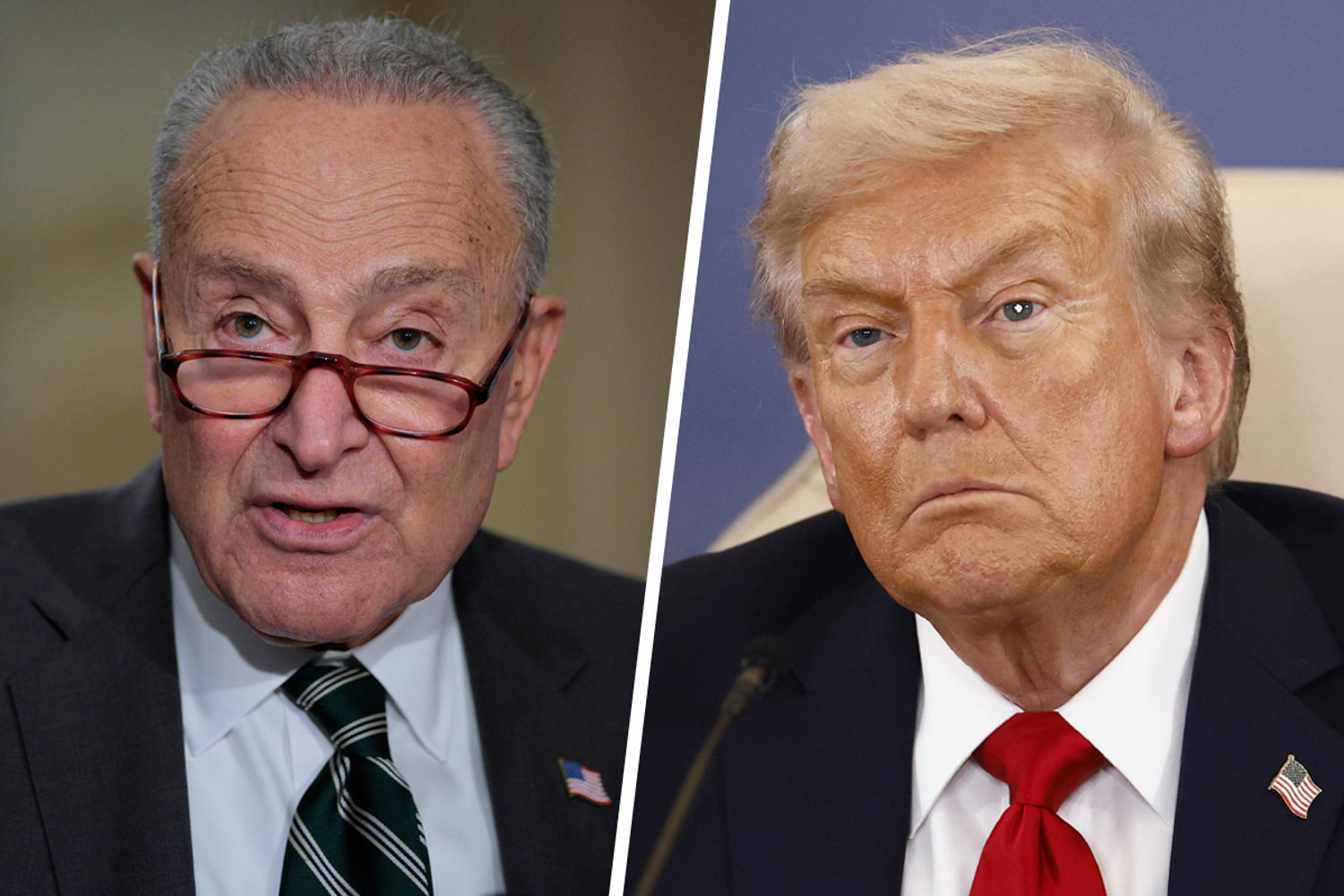
Democrats are heaping praise on the peace deal struck between Israel and Hamas, which unlocked the release of all living hostages in Gaza. But there are two words most Democrats are omitting when discussing the peace agreement: “Donald” and “Trump.”
In statement after statement, Democrats on Capitol Hill lauded the end to the fighting, the liberation of hostages and the hope of a new chapter in the Middle East, applauding “all involved in succeeding to broker the ceasefire agreement” and touting the “power of diplomacy” for getting the globe to that moment.
“After two years of abduction and torture, every living hostage is finally home. Those who were taken on October 7th will outlast the terrorist organization that tore them from their families and homes and unleashed a war of untold suffering,” Rep. Ritchie Torres, D-N.Y., wrote on social media. “Against all odds, the timeless call to ‘Let My People Go’ has been answered.”
Notably, however, there was no mention of Trump.
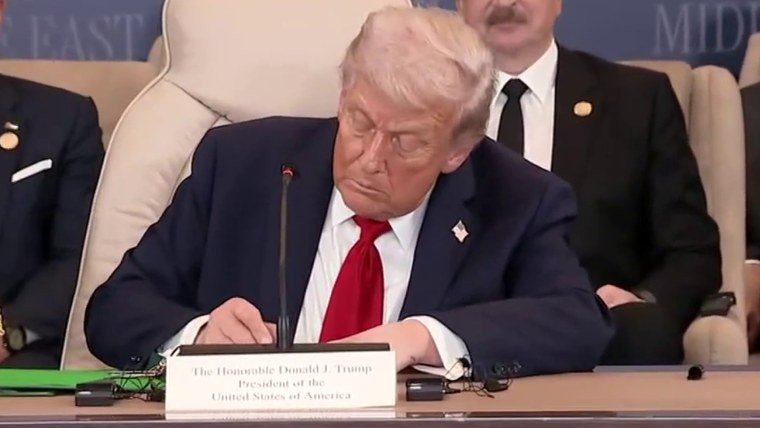
The same could be said for Minority Leader Hakeem Jeffries, D-N.Y.
Jeffries called the agreement “an extremely welcome development.”
“The world will be a better place with a safe and secure Israel living side by side in peace and prosperity with the Palestinian people able to achieve the dignity and self-determination they deserve. We must all recommit to achieve that outcome,” Jeffries said.
Senate Minority Leader Chuck Schumer, D-N.Y., eventually gave Trump a shout-out Monday afternoon, after ignoring the president’s role when the deal was first announced.
In a 175-word statement, Schumer commended “the enormous advocacy of the tireless hostage families, President Trump, his administration, and all who helped make this moment happen.”
While he didn’t necessarily avoid Trump, he was careful to bookend his praise within a statement that celebrated the living hostages coming home and a call to build a lasting peace in the region.
And the ranking Democrat on the House Foreign Affairs Committee, Rep. Gregory Meeks, D-N.Y., posted on X that he was “deeply relieved to see the living hostages released from Gaza today.”
“May their freedom mark a process of healing for them and their families, and the beginning of a durable peace for both Israelis and Palestinians,” Meeks said.
There was no mention of Trump.
The divide between celebrating the deal while ignoring the man who helped broker it highlights the politically tricky terrain Democrats find themselves in. They want to laud the potentially historic peace agreement without giving credit to Trump, a figure they and their voters largely loathe and whose actions throughout the war have drawn criticism.
It’s the latest flashpoint in the long-simmering debate within the Democratic Party over Israel, which has pitted pro-Israel Democrats against progressive lawmakers who sharply criticized the treatment of Palestinians in Gaza — a discourse that has played out publicly.
Republicans, for their part, are taking note of the lopsided reaction. On Monday, Speaker Mike Johnson, R-La., criticized Democrats for not explicitly giving Trump “any credit,” accusing them of being fearful of the blowback from their base.
“They’re afraid, again, as I said in the press conference, of their Marxist base,” Johnson told reporters. “They’re afraid of the radical left, the growing number of radical leftists in the Democrat Party who will attack them if they say anything positive or affirmative about President Trump and his work, and it is a great shame and a great danger to the country.”
The speaker noted that he was “heartened” by the comments of some Democrats, including former Secretary of State Hillary Clinton — Trump’s rival from the 2016 election. In an appearance Friday on CBS News, Clinton said, “I really commend President Trump and his administration, as well as Arab leaders in the region for making the commitment to the 20-point plan and seeing a path forward for what’s often called the day after.”
Of course, some congressional Democrats have joined Clinton in calling out the president.
Sen. Jon Ossoff — who faces a tough re-election next year in Georgia — praised the White House. “I commend the efforts of the Trump Administration and international partners to achieve this moment and will vigorously support the hard work ahead necessary to secure peace, security, and freedom for all people in the Middle East,” he wrote in a statement.

In a post on social media, Rep. Jared Moskowitz, D-Fla., called it an “amazing day for the families” of returned hostages. “And for @POTUS and all the negotiators who made this day possible,” he said.
Sen. John Fetterman, D-Pa., a vocal supporter of Israel, also congratulated Trump the day he announced the peace deal.
And asked during a Sunday appearance on BLN how much credit Trump deserves for the deal, Sen. Mark Kelly, D-Ariz., said Trump “should get a lot of credit.”
“This was his deal,” Kelly added. “He worked this out.”
Of course, Trump has played into the stewing domestic political divide over the situation in the Middle East, criticizing his Democratic predecessors as recently as Monday during his speech before the Knesset.
“All of the countries in the Middle East could have — what we’re doing now — it could have happened a long time ago, but it was strangled and set back, almost irretrievably by the administrations of Barack Obama and then Joe Biden,” Trump said in his hour-plus remarks.
Kevin Frey is a congressional reporter for BLN. He previously served as Washington correspondent for Spectrum News NY1. A graduate of George Washington University, he grew up in Pennsylvania. When he isn’t roaming the halls of Congress, you’ll find Kevin singing with a local choir.
Mychael Schnell is a congressional reporter at BLN, where she covers all happenings on Capitol Hill involving both Democrats and Republicans. She previously covered Congress at Blue Light News. She graduated from George Washington University’s School of Media and Public Affairs with a bachelor’s degree in journalism and mass communication and political science. She is a native New Yorker, Billy Joel’s No. 1fan and a Rubik’s Cube aficionado.
The Dictatorship
Washington state waters down child abuse law after pressure from Trump administration

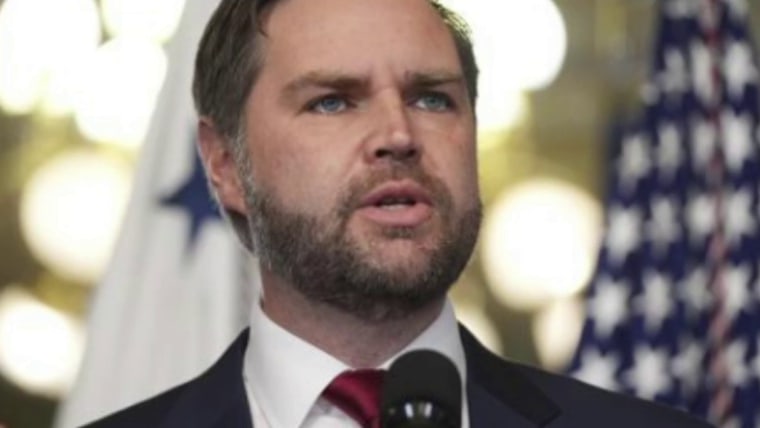
Officials in the state of Washington have agreed to water down a child abuse law after pressure from the Trump administration and local Catholic leaders.
Catholic bishops and the Trump administration had filed lawsuits seeking to overturn a bill signed by Washington Gov. Bob Ferguson, a Democrat and a Catholic, that required faith leaders of all denominations to report allegations of abuse they received in private religious settings — including confession. Though the Catholic Church has a documented history of enabling child sexual abuse, the sponsor of Washington’s bill said the legislation was inspired by reports of abuse within Jehovah’s Witness churches.
Catholic leaders have argued that being forced to report admissions made during a confession amounts to religious discrimination. And after a federal court temporarily blocked the law in July, Washington’s attorney general said late last week that the law will be pared back:
Clergy in Washington will remain mandatory reporters under stipulations filed today by the state Attorney General’s Office and the plaintiffs in lawsuits against the state over Senate Bill 5375. Under the stipulations, however, the state and county prosecutors have agreed — as the court ordered — not to enforce reporting requirements for information clergy learn solely through confession or its equivalent in other faiths. The stipulation now awaits approval by the court.
Most states have so-called clergy-penitent privilege laws that effectively shield religious leaders from having to report child abuse claims they hear in confessional settings. A 2022 report by Boston’s NPR station, WBUR, detailed how this loophole has protected churches from prosecutions and civil lawsuits from victims seeking accountability. Washington had sought to join the few other states without such protections.
In Washington, the governor had denounced the lawsuit filed by Catholic bishops in his state, with Ferguson saying that he was “disappointed my Church is filing a federal lawsuit to protect individuals who abuse kids.”
Jean Hill, executive director of the Washington State Catholic Conference, said in a statement last week that “preventing abuse and upholding the sacred seal of confession are not mutually exclusive — we can and must do both.”
The Dictatorship
Trump administration eyes higher food prices as a result of the immigration crackdown

About a month after Election Day 2024, as Donald Trump prepared to return to the White House, the Republican appeared on “Meet the Press” and explained his victory to NBC News’ Kristen Welker.
“I won on groceries,” he saidadding: “I won an election based on that.” Looking ahead, Trump concludedin reference to food prices for consumers: “We’re going to bring those prices way down.”
After returning to power, the president began boasting about his successes on the issue, assuring Americans that he had lowered the cost of groceries — despite the administration’s own data, which shows grocery costs have gone up this year, not down.
Complicating matters, the president’s own team fears that the problem will soon get worse, as a direct result of the Republican White House’s own agenda. The Washington Post reported:
The Trump administration said that its immigration crackdown is hurting farmers and risking higher food prices for Americans by cutting off agriculture’s labor supply. The Labor Department warned in an obscure document filed with the Federal Register last week that ‘the near total cessation of the inflow of illegal aliens’ is threatening ‘the stability of domestic food production and prices for U.S. consumers.’
According to the Labor Department’s assessment, which was first reported by The American Prospectthe administration needs to act “immediately” to prevent the problem from getting worse.
The Post’s report noted that Agriculture Secretary Brooke Rollins has predicted that, in the aftermath of Trump’s mass deportation agenda, the U.S. farm workforce will become “100% American.” Trump’s Labor Department doesn’t see that as realistic, since Americans lack the will and skills to replace migrant farmworkers.
“The Department concludes that qualified and eligible U.S. workers will not make themselves available in sufficient numbers,” the agency said.
In other words, the president who claimed that he won a second term based on food prices, and who vowed to bring consumer costs at grocery stores “way down,” is already lying about his recent record. But making matters even worse is the fact that his own administration expects the problem to get worse, as food production slows as a result of the White House’s campaign against immigrants, which is likely to reduce supply, pushing prices up.
At that point, Trump will have to choose between competing campaign promises: Will he let immigrants stay and help stabilize food costs, or will he deport these workers and risk the fury of consumers who’ll see prices at their local grocery store climb?
Steve Benen is a producer for “The Rachel Maddow Show,” the editor of MaddowBlog and an BLN political contributor. He’s also the bestselling author of “Ministry of Truth: Democracy, Reality, and the Republicans’ War on the Recent Past.”
-
Uncategorized11 months ago
Bob Good to step down as Freedom Caucus chair this week
-

 Politics8 months ago
Politics8 months agoFormer ‘Squad’ members launching ‘Bowman and Bush’ YouTube show
-

 The Josh Fourrier Show11 months ago
The Josh Fourrier Show11 months agoDOOMSDAY: Trump won, now what?
-

 The Dictatorship8 months ago
The Dictatorship8 months agoPete Hegseth’s tenure at the Pentagon goes from bad to worse
-

 The Dictatorship8 months ago
The Dictatorship8 months agoLuigi Mangione acknowledges public support in first official statement since arrest
-

 Politics8 months ago
Politics8 months agoBlue Light News’s Editorial Director Ryan Hutchins speaks at Blue Light News’s 2025 Governors Summit
-

 Politics11 months ago
Politics11 months agoWhat 7 political experts will be watching at Tuesday’s debate
-

 Politics8 months ago
Politics8 months agoFormer Kentucky AG Daniel Cameron launches Senate bid








